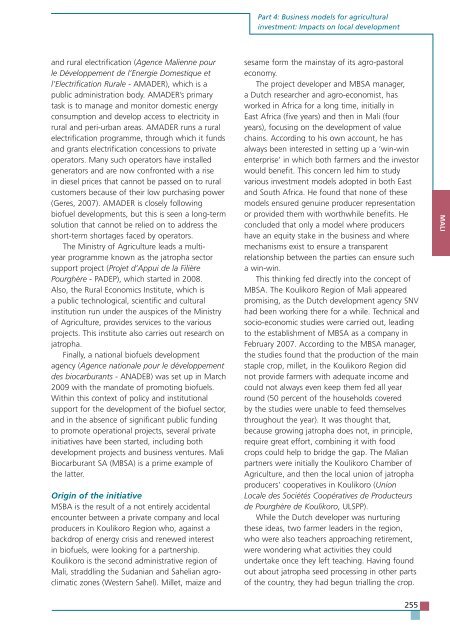TRENDS AND IMPACTS OF FOREIGN INVESTMENT IN DEVELOPING COUNTRY AGRICULTURE
TRENDS AND IMPACTS OF FOREIGN INVESTMENT IN DEVELOPING COUNTRY AGRICULTURE
TRENDS AND IMPACTS OF FOREIGN INVESTMENT IN DEVELOPING COUNTRY AGRICULTURE
Create successful ePaper yourself
Turn your PDF publications into a flip-book with our unique Google optimized e-Paper software.
and rural electrification (Agence Malienne pour<br />
le Développement de l’Energie Domestique et<br />
l’Electrification Rurale - AMADER), which is a<br />
public administration body. AMADER’s primary<br />
task is to manage and monitor domestic energy<br />
consumption and develop access to electricity in<br />
rural and peri-urban areas. AMADER runs a rural<br />
electrification programme, through which it funds<br />
and grants electrification concessions to private<br />
operators. Many such operators have installed<br />
generators and are now confronted with a rise<br />
in diesel prices that cannot be passed on to rural<br />
customers because of their low purchasing power<br />
(Geres, 2007). AMADER is closely following<br />
biofuel developments, but this is seen a long-term<br />
solution that cannot be relied on to address the<br />
short-term shortages faced by operators.<br />
The Ministry of Agriculture leads a multiyear<br />
programme known as the jatropha sector<br />
support project (Projet d’Appui de la Filière<br />
Pourghère - PADEP), which started in 2008.<br />
Also, the Rural Economics Institute, which is<br />
a public technological, scientific and cultural<br />
institution run under the auspices of the Ministry<br />
of Agriculture, provides services to the various<br />
projects. This institute also carries out research on<br />
jatropha.<br />
Finally, a national biofuels development<br />
agency (Agence nationale pour le développement<br />
des biocarburants - ANADEB) was set up in March<br />
2009 with the mandate of promoting biofuels.<br />
Within this context of policy and institutional<br />
support for the development of the biofuel sector,<br />
and in the absence of significant public funding<br />
to promote operational projects, several private<br />
initiatives have been started, including both<br />
development projects and business ventures. Mali<br />
Biocarburant SA (MBSA) is a prime example of<br />
the latter.<br />
Origin of the initiative<br />
MSBA is the result of a not entirely accidental<br />
encounter between a private company and local<br />
producers in Koulikoro Region who, against a<br />
backdrop of energy crisis and renewed interest<br />
in biofuels, were looking for a partnership.<br />
Koulikoro is the second administrative region of<br />
Mali, straddling the Sudanian and Sahelian agroclimatic<br />
zones (Western Sahel). Millet, maize and<br />
Part 4: Business models for agricultural<br />
investment: Impacts on local development<br />
sesame form the mainstay of its agro-pastoral<br />
economy.<br />
The project developer and MBSA manager,<br />
a Dutch researcher and agro-economist, has<br />
worked in Africa for a long time, initially in<br />
East Africa (five years) and then in Mali (four<br />
years), focusing on the development of value<br />
chains. According to his own account, he has<br />
always been interested in setting up a ‘win-win<br />
enterprise’ in which both farmers and the investor<br />
would benefit. This concern led him to study<br />
various investment models adopted in both East<br />
and South Africa. He found that none of these<br />
models ensured genuine producer representation<br />
or provided them with worthwhile benefits. He<br />
concluded that only a model where producers<br />
have an equity stake in the business and where<br />
mechanisms exist to ensure a transparent<br />
relationship between the parties can ensure such<br />
a win-win.<br />
This thinking fed directly into the concept of<br />
MBSA. The Koulikoro Region of Mali appeared<br />
promising, as the Dutch development agency SNV<br />
had been working there for a while. Technical and<br />
socio-economic studies were carried out, leading<br />
to the establishment of MBSA as a company in<br />
February 2007. According to the MBSA manager,<br />
the studies found that the production of the main<br />
staple crop, millet, in the Koulikoro Region did<br />
not provide farmers with adequate income and<br />
could not always even keep them fed all year<br />
round (50 percent of the households covered<br />
by the studies were unable to feed themselves<br />
throughout the year). It was thought that,<br />
because growing jatropha does not, in principle,<br />
require great effort, combining it with food<br />
crops could help to bridge the gap. The Malian<br />
partners were initially the Koulikoro Chamber of<br />
Agriculture, and then the local union of jatropha<br />
producers’ cooperatives in Koulikoro (Union<br />
Locale des Sociétés Coopératives de Producteurs<br />
de Pourghère de Koulikoro, ULSPP).<br />
While the Dutch developer was nurturing<br />
these ideas, two farmer leaders in the region,<br />
who were also teachers approaching retirement,<br />
were wondering what activities they could<br />
undertake once they left teaching. Having found<br />
out about jatropha seed processing in other parts<br />
of the country, they had begun trialling the crop.<br />
255<br />
MALI


